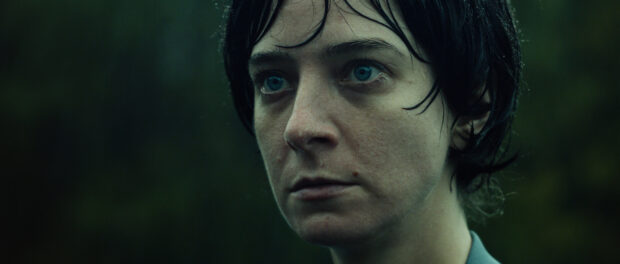Violation: A chat with directors Madeleine Sims-Fewer and Dusty Mancinelli
I had the amazing opportunity to interview Madeleine Sims-Fewer and Dusty Mancinelli for their powerful and ambitious feature debut Violation on Zoom. After its World Premiere at the Toronto International Film Festival, it has most certainly showcased their talent and passion as filmmakers we should look out for. Violation is a very personal journey for the main protagonist Miriam (played amazingly by Sims-Fewer) as she’s facing the pain of trauma and betrayal.
Steven Lee: First of all, I just want to say that I first got the press release saying they were looking for review and interview opportunities of this film. I actually saw Violation last year at the Festival Nouveau Cinéma in Montreal, and I have to say that it was a very unique, visceral, and personal story. I also felt like it added a lot to the revenge style of filmmaking, and it was one of the best features that I saw at the fest last year.
Dusty Mancinelli and Madeleine Sims-Fewer: Thank you so much!
Steven: More importantly, congrats again on the festival run of your film! To get things started, what was your reaction when you found out you were playing some big festivals such as TIFF, SXSW, and Sundance? That must have been a great feeling, right?
Madeleine: Yeah!
Dusty: It was. I mean, we were still in post-production when we got the call that we got into TIFF. And it just made it more intense that we had to finish the movie. But it’s such a great feeling, because as filmmakers we rely so heavily on the support from festivals and programmers who can really champion a film and get wider distribution as a result. So we’re really lucky.
Madeleine: And I think you never know. I mean, this is our first feature – you have no idea if people are going to respond to it and how they’re going to respond. So getting into TIFF, which was the first festival where we were accepted – it was kind of a massive relief we were going to play such an amazing festival.
Dusty: And we’re also local Torontonians. That’s really nice, just to be able to share your work in your own community.
Madeleine: I think Sundance for both of us was sort of a dream come true. Both of us have wanted to make films since we were little kids, and we see the Sundance laurels. It really felt like a dream when we got the call. We got the call really late in the evening, and it just felt like, “Is this real?” And I think we both woke up the next day wondering if it really happened.
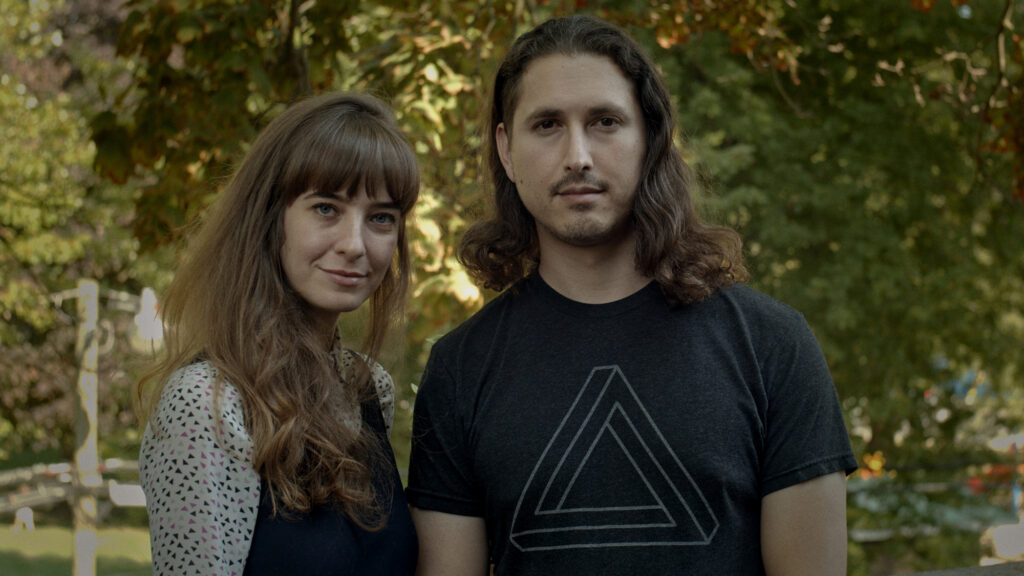
Steven: I feel like as Canadian filmmakers, it is a big deal to have your film shown at TIFF, right?
Dusty: Yeah, I mean that shock and disbelief takes a while to settle. Peter Kuplowsky, who programs the Midnight Madness section, took a leap of faith with the film. It is provocative and challenging, and I think the Midnight program is a perfect kind of place at home for it. And at Sundance, it’s the same thing. Their Midnight category is amazing.
Steven: Speaking of this being your feature debut, I was wondering what it feels like to go from directing short films together to finally taking on your feature debut? Also, what made you two want to pursue filmmaking in the first place?
Dusty: Yeah, I think I always had this feeling that I wanted to be a filmmaker ever since I was a little kid. My dad had a video camera, and I was just obsessed with the idea of documenting things. I remember the very first time I made an edit using two VHS tapes. My sister was walking down into the basement, and I remember placing the camera upstairs. I then went into the basement, and I captured her walking down the stairs with a simple edit. And it felt so magical that she suddenly walked down those stairs in those two cuts. It just transformed my obsession with film.
Madeleine: Yeah, it was the same for me. We had a video camera growing up, and I used to make movies with my sisters. I actually have a similar story of making an in-camera edit where we filmed my sister in a field looking for her glove, and then shut the camera off and shot a close-up of the hand coming in to pick up the glove. That moment was just stuck in my mind, and this is the magic of filmmaking. I think I was about six years old.
Dusty: Yeah, it’s like you’re constructing a world that didn’t exist before and telling a story through moving images. I mean, honestly, a short is very nerve-wracking, because you don’t have a lot of time to make them. We made our shorts on a shoestring budget. You shoot for two days, or if you’re lucky I think on one of our shorts it was five days.
Madeleine: Actor availabilities are always tough. No one is getting paid.
Dusty: It’s just so hard. I think as a short filmmaker you look to features as this daunting and intimidating process. It’s so mystical to you, but it’s really just like making a short film except you have a lot more time on your hands.
Madeleine: I think also with shorts you’re kind of making them in a little bit of vacuum, because the audience for shorts is very specific and they’re cinephiles. They’re very independent film focused people. When you’re making a feature, I don’t think I was prepared for the amount of people that would see it.
Dusty: Yeah, the scrutiny of everyone. It’s been an emotional roller coaster.
Steven: I can imagine. As many people may know, when they first hear about this movie, it does deal with some heavy subject matter. What are some of the reasons you decided to do a film about it? How did it all come about?
Dusty: Yeah, we met at the 2015 TIFF Talent Lab, and at the time we were just making our own films. But we really bonded and connected as friends, and then we decided to start working together. We were both looking for a collaborator and we had similar creative sensibilities. Our shorts dealt with very similar themes of trauma and abuse. And for us, Violation is the culmination of all these shorts and all these themes that we’ve been exploring. It comes from a very personal place for both of us. We both experienced trauma and abuse in our past, and we wanted to make a film from the point of view of someone who’s dealing with their trauma and the impact it has on emotional psychological unravelling. Revenge is often portrayed in films as this cathartic rewarding experience, but in fact we were more interested in the kind of grizzly nature of revenge, and how it really has this tendency to destroy relationships.
Madeleine: I think as well we knew that it was going to be an uphill battle making our first feature. We knew how hard we would have to work. We knew the long hours we were going to have to put in, and we wanted to make it about something we really cared about – this is something we were passionate about at the time we were writing it. I think that passion has to carry through, since we’ve been working on this for three years.
Dusty: Yeah, you really need to care about it. I think for us in many ways Violation is kind of the end of a chapter, because I feel like we said everything we have to say now about that particular topic. We’re really excited about moving in a new direction as a creative team.
Steven: Certainly. The themes of trauma and betrayal can definitely be felt while watching the movie, and they’re portrayed in a very honest and realistic way. Was it difficult to set up the tone and atmosphere from the get-go?
Madeleine: We spent a lot of time working on the tone, atmosphere, and aesthetics. Not just between us, but with all of our key creatives, and all of our team. Our team is so small that we were able to really get everyone completely aligned, especially since we were all living together – the cast and crew as well. We spent so much time prepping together, having dinner together, and getting to know one another. It was a heavy atmosphere, but there was also a lightness and camaraderie on set, which kind of undercut the heaviness of the tone and subject matter.
Dusty: Also because we write together. We’re thinking about the mood, tone, and feeling right from the beginning and the outlining process. We’re looking for visual references, and we’re constantly trying to find a unified vision. So by the time we go into pre-production, we already have a plethora of references that we could start using to help guide our key creatives, like our cinematographer Adam Crosby and our amazing production designer Joshua Turpin. These references really got everyone on the same page and hopefully seeing the same movie that we saw in our heads.
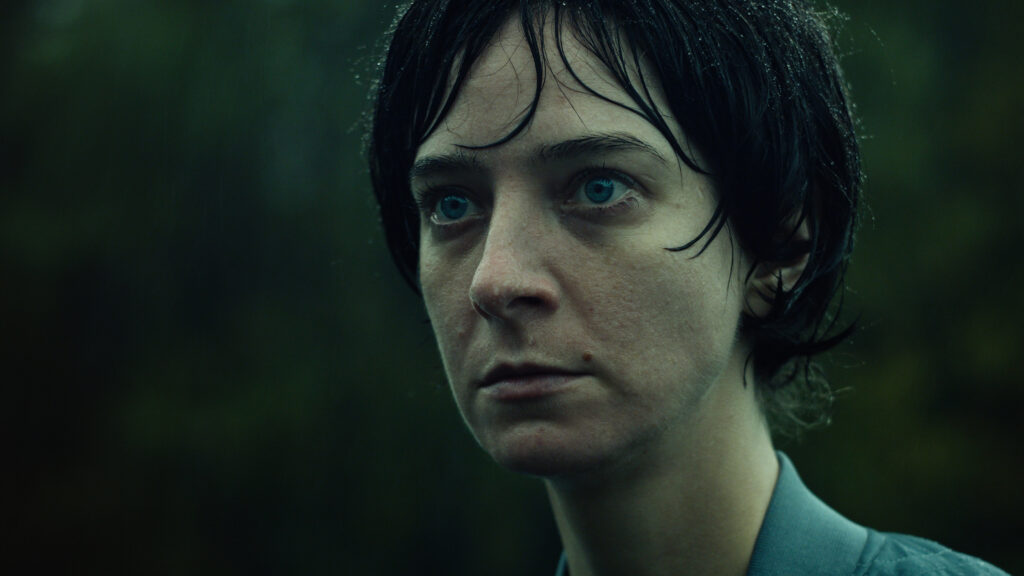
Steven: After seeing the film, I noticed that it had such methodical pacing, which asks the audience to be patient and reflect on the story. While writing the script, what was it like to come up with the narrative structure?
Madeleine: It was kind of a puzzle, because we came up with it while writing it. It was really important to us that the structure kind of reveals two things. One is the trauma. This feeling of trauma that the main character Miriam is going through. She’s going through trauma, and she’s unable to get over it. We loved this idea of trauma bringing you back to this specific event no matter where you are. It was like mental time travel where something can trigger you from a smell, thought or word that you’re suddenly back there. The other thing that was important to us was re-contextualizing characters, which kind of runs through our work. I think that’s one of our strengths as a male/female creative team. We have these different perspectives, and we wanted to pay credence to the different perspectives of these characters as well – they’re not one-dimensional. As an audience member, you’re seeing these people act something out, and you judge them or have an opinion of how they are, but then the narrative brings you to a point in time where their actions take on new meaning.
Dusty: It’s really structured in a way to hopefully help you understand and empathize with this woman’s psychological unraveling. She feels betrayed by not only with her brother-in-law, but also by her sister, and how that kind of pushes her into doing these unthinkable things.
Steven: It’s important to mention that it’s a beautifully shot film from start to finish. It’s absolutely stunning to look at, and I would like to give some props to the cinematographer for his amazing job. How did you come up with the cinematic look of Violation?
Dusty: That’s a great question. We’re really interested in trying to capture a grounded naturalistic visual aesthetic. And for us, the way we attempted to accomplish that with our cinematographer Adam Crosby was by utilizing all natural lights. We really forced ourselves not to light at all, so instead you are choosing your locations methodically, carefully blocking your actors around an available window light and using incandescent light bulbs. You’re now working closely with your production designer to shape the light with curtains and lamp shades. There’s a craft in trying to control and shape available lights for a very specific look. And also, we had a crazy shooting schedule where we would shoot one scene over five days. For example, when she’s getting the rabbit, there was a very specific time of day. It’s that hour of light just before it gets dark, and we knew we can only shoot one actor’s angle during that one moment.
Madeleine: We wanted a very unique look that we don’t feel we’ve seen too much before. That feeling of being grounded and natural, but also it feels a little bit like a fairy tale.
Dusty: There’s a heightened quality that comes through maybe from the fog.
Madeleine: Especially working with our production designer Joshua Turpin was really key in creating this fairy tale with the choice of our locations.
Dusty: And there’s a lot of magic in filmmaking. For example, the opening shot of the movie feels like a fairy tale. You have this bridge, and you’re in this lush wooded area of this beautiful lake with a rolling fog. We actually went back to reshoot a different scene, and it was just overcast. We looked down, and we were like, “Look at that! That’s incredible! That’s a spectacular shot there that we should go run and do.” So it’s just about keeping your eyes open and looking for opportunities that present themselves. A lot of the times as a filmmaker, you’re obsessed with a plan, and then the plan never happens the way you want it to happen with these unexpected things. It’s really just about being really adaptive to our environment.
Steven: The musical score really added a lot to the fairy tale element of Violation as well.
Dusty: Yeah, I mean our composer Andrea Boccadoro is really so talented. I met him in Iceland, and Madeleine met him in Berlin. This is our third collaboration.
Madeleine: We had two disparate ideas for the score, which were kind of like church and avant-garde music. He took those two completely almost opposite references, and he made it something absolutely magical that feels like it fit together so well.
Dusty: There’s not a lot of music in the film, but it stands out when there is music. It acts like a deliberate transition that amplifies how we move between the present and the past, as the trauma washes over us as an audience.
Madeleine: He’s also an incredibly tasteful and restrained composer who’s really key for this, because it allows the audience to feel the emotions. We really wanted the music to just kind of underpin the feeling, mood and tone, and he did it perfectly.
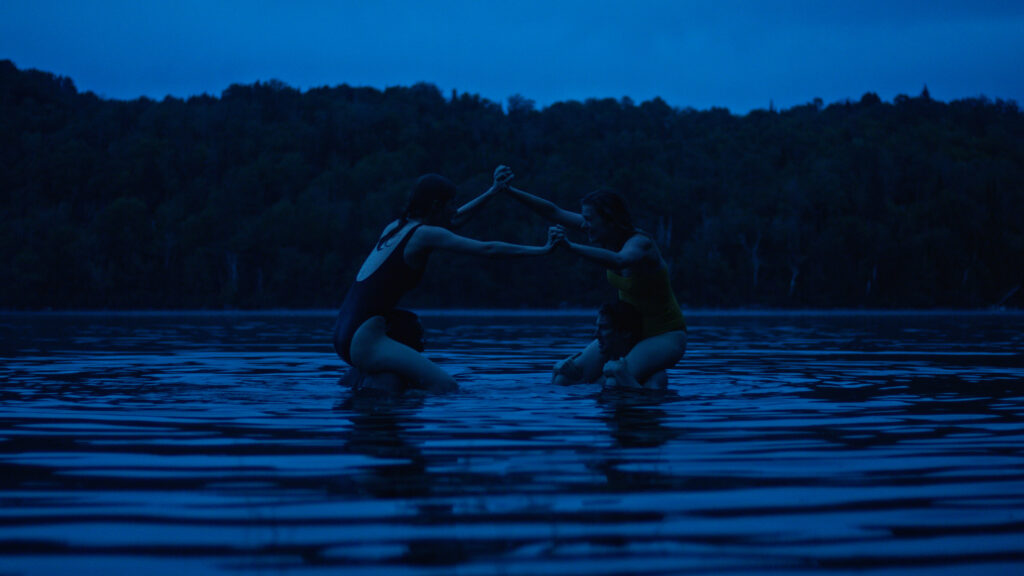
Steven: For a film like Violation, do you prefer people to come into it already knowing the premise or watching it blind?
Dusty: That’s a great question. It’s a challenging question. Personally, I always love to know nothing about a film. I don’t like watching trailers. Trailers tend to reveal too much, and I just want to know nothing. Usually, a poster is enough for me to watch a movie. I think this is so challenging for a film like this, because it’s about trauma, sexual violence, and it’s also very graphic in many ways. I think what Sundance did, which was interesting, was they put a little warning at the beginning of the film. So you didn’t need to know anything about this movie. You had a chance to prepare yourself. I think that’s maybe the ideal circumstance.
Madeleine: I do think some of my best cinematic experiences have been with movies I’ve known absolutely nothing about, although I’m the type of person who will read the last page of the book before I read it.
Dusty: Also, it’s best when you don’t know what other people think. If you can go into an experience where you get to just form your ideas, thoughts, and impressions without any outside influence, that’s ideal.
Madeleine: I remember watching Dancer in the Dark, and the only reason that I rented it was because Björk was in it. I knew nothing about it. I’ve never seen a Lars von Trier film, and I rented this movie because of Björk. I absolutely loved it, but it was so disturbing. So enthralling. Experiences like that are great.
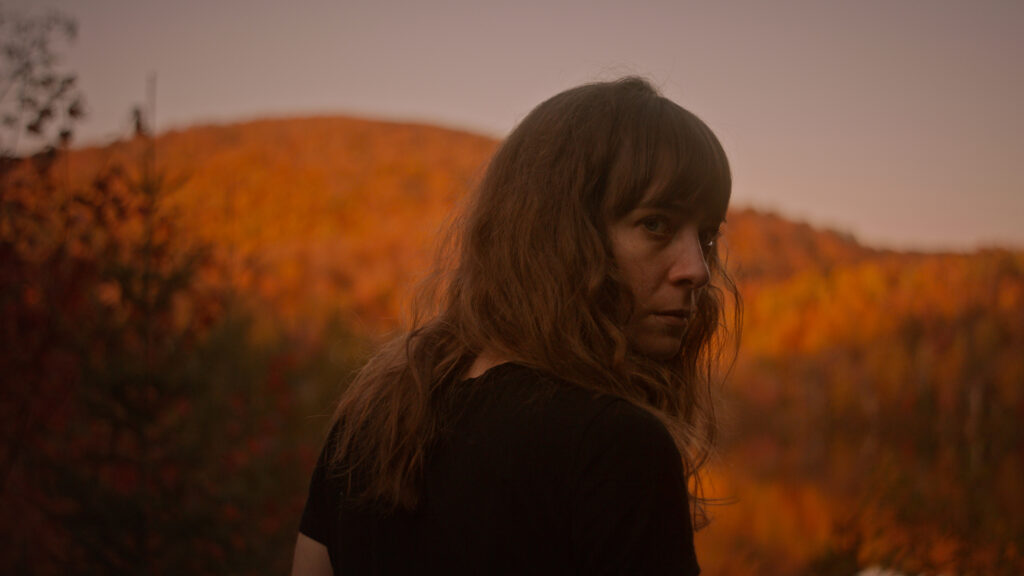
Steven: And finally, what’s next for you two as filmmakers?
Dusty: After we made our short film Woman in Stall, we officially joined forces as a creative team. We’re really excited about making something that’s distinctively different from Violation, because we have a wide range of tastes as a partnership. We love sci-fi, we love mystery, we love time travel and dark comedy. We’re really developing a bunch of projects that are distinctively different, and I think with our first feature, we didn’t realize we had to watch this movie like a thousand times. And when you watch this movie so many times, the disturbing nature of it really wears on you, so we’re really excited about just making something that’s really fun. We’re currently writing our next thing. We can’t say much about it, but we can maybe say it’s a mystery thriller.
Violation is currently streaming on TIFF Lightbox, and will be on Shudder as of March 25, 2021.

